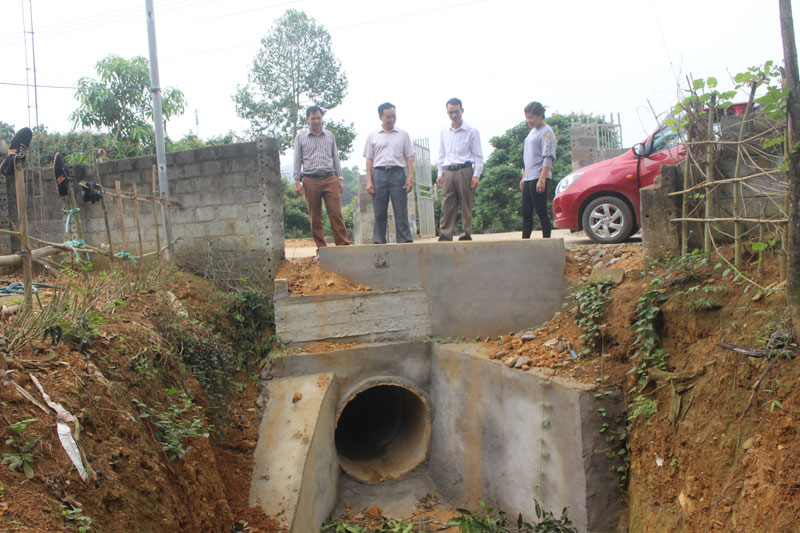
(HBO) – The rough and muddy roads have been gradually concretised, while the cultural houses in hamlets and villages have been built, serving as gathering, art and sport exchange places for residents in Kim Boi district, northern Hoa Binh province.
The once dry fields have now
become green with melon, chilly, gourd and maize plants. The farms raise from
several hundreds to thousands of chickens. Home gardens have been renovated
into orchards with high economic value.
They are the vivid illustration of changes in
the way of thinking and doing of locals in communes in areas benefitting from
the Programme 135 on Poverty Reduction in Kim Boi district.
 Officials
from ethnic affair department of Kim Boi district and Son Thuy commune examine
quality of a road in Khoang hamlet.
Officials
from ethnic affair department of Kim Boi district and Son Thuy commune examine
quality of a road in Khoang hamlet.
Head of the ethnic affair department of Kim
Boi district Nguyen Thanh Trung said implementing Programme 135, the district
has carried out effectively ethnic policies and programmes via investment in
building infrastructure, maintaining construction works, supporting production
development, building water supply facilities, and providing direct support for
poor households.
These activities have positively contributed to
the local socio-economic development as well as security-defence and social
order and safety. In particular, the programmes and projects are carried out in
a democratic and transparent manner from the grassroots level, with investment
made for the right purposes and target beneficiaries, thus strengthening the
trust of people in the Party and State’s ethnic affair policies.
Implementing effectively tasks on the ethnic
work, infrastructure in rural areas of Kim Boi district has step by step
upgraded. Ethnic people have changed their way of thinking and actively worked
to develop the household economy. To date, the rate of poor households in the
district’s urban area has reduced to 20.17 percent. The average annual per
capita income is estimated at over 22.6 million VND (971.8 USD). These outcomes
have significantly contributed to political stability and security in ethnic
minority areas in Kim Boi district as well as promoting the great unity of the
nation in the process of building and development./.
The Standing Board of the Hoa Binh provincial Party Committee has agreed in principle on a proposal by the Standing Board of the Party Committee of Hoa Binh city to gather feedback on the city’s 1:2000 zoning plan, which forms part of its broader urban development strategy.
Hoa Binh province has made notable progress in public administration reform and digital government development, with the satisfaction index among citizens and businesses reaching over 84%, according to recent government evaluations.
Thanks to great efforts by local authorities in recent times, the governance and public administration performance of Mai Chau district has been significantly improved.
In the afternoon of June 6, the Party Committee, the People's Council, the People's Committee and the Fatherland Front of Lac Son district solemnly held a meeting to celebrate the 139th anniversary of the district's founding (1886–2025) and the 79th anniversary of the establishment of the district's Party Committee (1946–2025). There was the attendance of Mr. Bui Van Thang, the Vice Chairman of the Provincial People's Council; Mr. Quach Tat Liem, the Vice Chairman of the Provincial People's Committee; Ms. Dang Bich Ngoc, the Deputy Head of the National Assembly Delegation of the province; as well as the former leaders of the province and district through various periods, who are the natives of the district.
Implementing the Politburo’s Resolution No. 57-NQ/TW on breakthroughs in science – technology, innovation, and digital transformation is a golden opportunity for the northern mountainous province of Hoa Binh to renew growth model, improve competitive edge and shorten digital gap.
Resolution 57-NQ/TW, issued by the Politburo on December 22, 2024, identifies sci-tech, innovation, and digital transformation as strategic breakthroughs to build a developed and prosperous nation. In Hoa Binh province, this spirit is not just a slogan, it’s being put into action through concrete initiatives that form a "new development triangle”: digital citizenship, digital economy, and digital administration.



 Officials
from ethnic affair department of Kim Boi district and Son Thuy commune examine
quality of a road in Khoang hamlet.
Officials
from ethnic affair department of Kim Boi district and Son Thuy commune examine
quality of a road in Khoang hamlet.